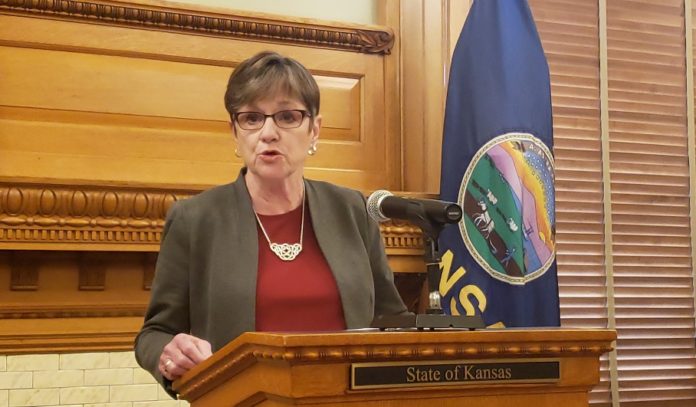Gov. Laura Kelly on Monday signed an executive order restoring limits on evictions and mortgage foreclosures as Kansans grapple with the economic hardships resulting from the coronavirus pandemic.
“This pandemic is still devastating to our communities and preventing people from working,” Kelly said at a news briefing Monday.
“No Kansans should be kicked out of their home during this pandemic. That’s just wrong,” Kelly said.
She issued the order as the federal government’s $600-a-week supplement for unemployment benefits has lapsed.
She said the order will remain in place for two weeks to see if the U.S. Senate acts on a new unemployment benefit. If not, Kelly said she will extend the order.
The order says no bank or lending institution shall foreclose on homeowners for defaulting on their mortgage payment because of financial struggles related to the pandemic.
It also prohibits landlords from evicting residential tenants for failing to make their rental payments because of the pandemic.
The state’s unemployment rate reached its highest point in more than 40 years when it rocketed up to nearly 12% in May.
It has receded a bit in recent months, falling to 10% in May and 7.5% in June. By comparison, the state’s unemployment rate was 3.1% in May and June 2019.
The order does not relieve anyone from a mortgage or rental payment if they have not suffered from the financial consequences of the pandemic.
“This doesn’t allow somebody just to decide they don’t want to pay the rent,” Kelly said. “It has to be pandemic related.
“It can’t be that somebody’s being evicted because they have pets in an apartment where there was a no-pet rule.”
The order must be reviewed by the State Finance Council. The council does not have the power to overrule the order.
Earlier this summer, Kelly allowed to lapse an executive order prohibiting landlords and lenders from evicting renters and foreclosing on mortgages during the emergency disaster declaration.
“I know that the economic impact of this virus has been brutal for homeowners and renters alike,” Kelly said in June shortly after the first executive order expired.
“I want struggling Kansans to know that I understand how you feel and how fearful you remain for your future,” she said.
She said it was a no-win situation. Lifting the order puts a burden on homeowners and renters who may be out of work and facing financial hardship. Leaving the order in place hurts the landlords and lenders.
On Monday, Kelly said her administration is considering ways to support landlords while the executive order is in place.
“We are really just starting to explore what options we might have to provide for landlords,” Kelly said.
“We really do understand,” she said. “Some of them have gone a long time without being able to collect rent and they’ve got expenses too.”
A recent national report showed that the delinquency rate on mortgage payments in May had reached its highest mark in more than eight years as the economy stumbled during the pandemic.
Black Knight, a Jacksonville, Florida firm that provides data and analytics to the mortgage and real estate industries, reported 723,000 homeowners nationwide became past due on their mortgages in May.
The firm reported that there were 4.3 million homeowners past due on their mortgages or in active foreclosure, including those instances where there are agreements either lowering or delaying mortgage payments.
By comparison, there were about 2 million homeowners past due on their mortgage at the end of March.
The national delinquency rate with loans 30 days or more past due (not counting foreclosures) was at 7.76% in May, up about 20% from April and about 131% year over year, the company reported.
The states with the highest rates were Mississippi (12.7%), Louisiana (11.8%), New York (11.3%), New Jersey (11%) and Florida (10.5%). No data was available for Kansas.
The national delinquency rate fell in June for the first time since January, as the initial affects of the pandemic started to level off.
Nearly 7.6% of mortgage holders remain delinquent, up from a record low 3.2% at the
beginning of the year, Black Knight reported.
The number of borrowers 90 or more days past due surged in June to 1.87 million, the
largest volume since 2011.
The firm warned that delinquency numbers for mortgages will be important to watch in August and September, especially with uncertainty about the fate of unemployment benefits .












